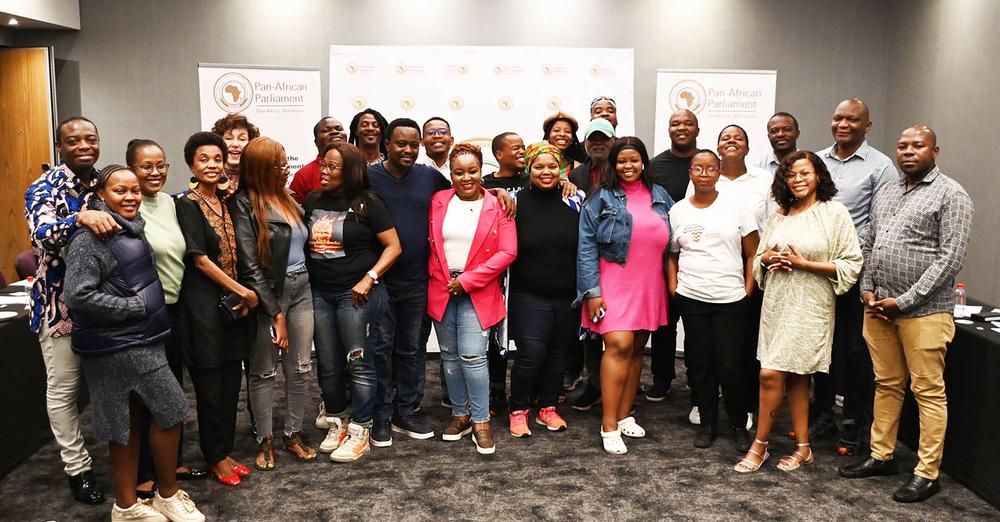|
Getting your Trinity Audio player ready…
|
The Pan-African Parliament held a three-day media capacity-building workshop for journalists in the Southern African Region from 16 to 18 May 2024 in Cape Town, South Africa. The exercise was the second media training by the Pan-African Parliament and was a targeted effort to address the visibility challenges encountered by the PAP in South Africa and throughout the region.
The engagement will also serve as a platform to sensitize the media on the significance of the 20th Anniversary of the PAP and chart a new course for the PAP and media collaboration going forward. By enhancing media engagement, the Pan-African Parliament aimed to amplify its visibility and strengthen its role as a key institution within the African Union, fostering informed citizenry and democratic governance.
The workshop further stemmed from the recognition that media plays a critical role in fostering awareness of Africa’s agenda, as well as demanding accountability and transparency from the public and private sectors.
The three-day training covered several key areas. These include Contextual Reporting, which focuses on understanding complex organizations and ensuring accuracy; Ethical Reporting in journalism; Strategies for improving media relations; Identifying effective entry points for media engagement; and the role of the media in enhancing the reporting of the Continental agenda.
Addressing the media, Hon. Chief Fortune Charumbira, President of the Pan-African Parliament, underscored the importance of the legislative arm of the AU and the fourth estate complementing each other in the process of building an informed citizenry, holding the executive accountable, and creating mechanisms for evaluating progress on achieving continental goals in the areas of development, economy, peace and security, and health, among others. However, the President underscored that this work must be done within the norms of good journalism.
Participants included journalists from South Africa, Malawi, Eswatini, Botswana, Namibia, Zimbabwe, Tanzania, Lesotho, DR Congo, Mozambique, and Zambia. The media training did not only provide an opportunity to learn about the Continental Parliament but also an opportunity to learn from colleague journalists from other countries.
Recognizing the importance of access to information, journalists said the Pan-African Parliament should ensure that its officials and Members of Parliament from member states make themselves readily available for interviews with the media, either in person or virtually.
They argued that for the PAP to be regularly featured in the news, the leadership should promptly state their position on topical issues and developments affecting the African continent, particularly those impacting regional integration, development, peace, and security.
Both parties acknowledge the crucial role each partner plays in educating, informing, and shaping the minds of African citizens on issues impacting the development of the African continent.
Journalists and the Pan-African Parliament Media and Communications Unit agreed to collaboratively establish guidelines for addressing media requests for interviews and meeting deadlines.
To sustain and enhance the strong partnership with the media, the PAP Media and Communications Unit pledged to proactively provide the media with timely information from the parliament, including press releases, video, and audio clips.
The parties resolved to work to find common ground on handling interview requests and deadlines as well as interactions between the media and the leadership of the Pan-African Parliament.
The Pan-African Parliament Media and Communications Unit was urged to release the timetable for statutory meetings (including Committee Sittings and Plenary Sessions) well in advance to enable adequate planning.
Participants recognized the critical role and impact of the African Parliamentary Press Network (APPN) in mobilizing media on the African Continent to support and create visibility for the Pan-African Parliament, in the framework of the Memorandum of Understanding (MoU) between both parties.
There was a resolution that immediate steps should be taken to mobilize South African journalists to join the APPN, as it has proven to be an effective platform for education and information sharing about Continental, Regional, and National Parliaments. Additionally, all Country Caucuses (National Chapters) of the APPN were encouraged to work to localize information about the Pan-African Parliament.
The Pan-African Parliament Media and Communications Unit pledged to enhance its collaborative efforts with the African Parliamentary Press Network (APPN) to actively engage with media editors, urging them to prioritize coverage of Pan-African Parliament events and initiatives.
The Pan-African Parliament and the APPN pledged to continue to work together to identify various ways to reach out to more journalists to give publicity to the Pan-African Parliament and other African Union organs.
